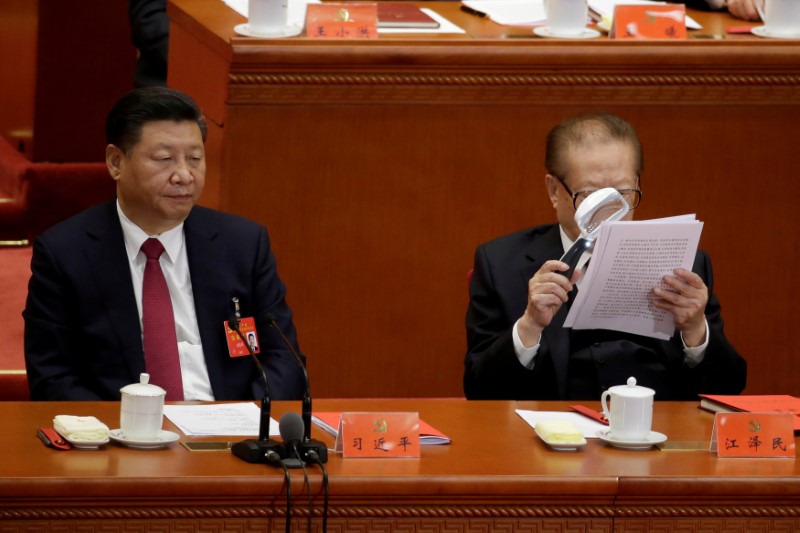By Brenda Goh and John Ruwitch
SHANGHAI (Reuters) - Chinese President Xi Jinping's vast "Belt and Road" infrastructure project was unexpectedly included in the ruling Communist Party's constitution on Tuesday, giving it greater policy heft and added pressure to succeed.
The party's amended charter, approved at the close of its twice-a-decade congress, pledged to "pursue the Belt and Road initiative", a further sign of Xi's expanding power and evidence that the ambitious "Silk Road"-like initiative will endure beyond Xi's tenure.
It also underscores how the Communist Party has increased its attention to foreign policy and reflects Xi's growing desire for China to take a global leadership role, analysts said.
"Everyone knows that the Belt and Road is very important to Xi, it has his personal stamp and authority," said Peter Cai, a non-resident fellow at Sydney-based think tank Lowy Institute.
"But to have major policy, especially an external engagement policy, to be written into a party constitution, at least in recent memory, it is something quite significant," he said.
First mentioned during a speech Xi gave to university students in Kazakhstan in 2013, the plan is a vehicle for China to take a greater role on the international stage by funding and building global transport and trade links in more than 60 countries.
Xi has heavily promoted the initiative, inviting world leaders to Beijing in May for an inaugural summit at which he pledged $124 billion (£94 billion) in funding for the plan.
Local Chinese governments as well as state and private firms have rushed to offer support by investing overseas and making loans.
Some critics argue that China is exporting excess industrial capacity to spread its influence, and that the initiative, which has seen developing countries take on heavy debt, needs higher standards of governance and transparency.
"China has made commitments and pledges to many developing countries and it will take that length of time, 10 years or more, to complete the initiative," said Rajiv Biswas, Asia Pacific chief economist at IHS Markit.
"This has also strengthened China's soft power globally, so it wouldn't make sense for China's point of view to suddenly pull away from all of this," he said.
Other analysts said its inclusion could be a double-edged sword that adds pressure for the initiative, which remains broadly defined and leaves much to interpretation, to succeed.
"The danger of having given it greater visibility is that actually there are going to be more of those efforts to play to the policy in a political way rather than considering carefully the costs and benefits of each portion of what one is doing," said Dali Yang, a professor at the University of Chicago.
Many private investors have jumped on the bandwagon to describe their projects as Belt and Road-related, while local governments have rolled out individual Belt and Road plans.
The heads of Chinese firms including China Communications Construction Co (SS:601800) (HK:1800) and China Aerospace Science and Industry Corporation [SASAAI.UL] told Reuters during the week-long congress that they would place greater focus on developing their overseas businesses in support of the Belt and Road initiative.

The party congress saw Xi cement his power ahead of a second five-year term and put him in the same company as the founder of modern China, Mao Zedong, with the enshrinement of his political thought into the country's constitution.
(Additional Reporting by Matthew Miller in Beijing; Editing by Tony Munroe and Nick Macfie)